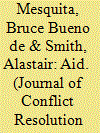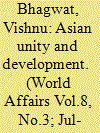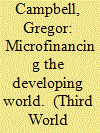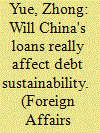| Srl | Item |
| 1 |
ID:
119961


|
|
|
|
|
| Publication |
2013.
|
| Summary/Abstract |
Temporary membership on the United Nations Security Council (UNSC) has pernicious effects on the political and economic development of nations, particularly in nondemocracies. The leaders of rich democratic states often trade resources for the salient policy favors that UNSC members can deliver. This provides the leaders of temporary UNSC members with access to "easy money" resources. Such resources have deleterious consequences, particularly in nondemocracies, because they provide leaders with the means to pay off their coalition of supporters without reliance on tax revenues. While foreign aid is an important form of easy money bribe, it is but one of many. Empirical tests show loans are a substitute means for bribing UNSC members.
|
|
|
|
|
|
|
|
|
|
|
|
|
|
|
|
| 2 |
ID:
135541


|
|
|
|
|
| Summary/Abstract |
The winding down of colonial empires in the middle of the twentieth century was greeted by a wave of revolutionary and reformist idealism in the newly liberated countries of the third world. many international agencies and movements rose to address the inequalities and injustices inherited from the old system but a reaction from the dominant former imperial powers managed to block or reverse that evolution and establish a subtler neo-colonial exploitative regime through the mechanism of globalization enforced by the petrodollar reserve currency, major banks and multinational corporations. Today various international associations such as ALBA, ASEAN, and BRICS are developing alternatives to the hegemonic Euro-American order.
|
|
|
|
|
|
|
|
|
|
|
|
|
|
|
|
| 3 |
ID:
122481


|
|
|
|
|
| Publication |
2013.
|
| Summary/Abstract |
From September 2012 most home undergraduates at English universities are being charged fees of £9,000 per annum. These are funded by a government loan, which attracts interest from the moment they start their course; after three years their accumulated debt exceeds £30,000. They can also borrow to cover their living costs, on the same terms, so that those studying in London can graduate with a debt of more than £50,000-although those from low-income families can obtain grants and universities are encouraged to provide bursaries and other support to students from underrepresented groups. Graduates start repaying their debts once their annual income exceeds £21,000-at a rate of 9% of the difference between their income and that figure: until the debt is fully repaid it continues to attract interest, by as much as three percentage points above the current inflation rate. Using data from a calculator on a government website, this paper shows that the highest-paid graduates pay back less than those on middle incomes: the 'squeezed middle' pays back more not only than those on low incomes but also the better-paid and those whose incomes increase more rapidly. This has differential effects according to occupation-and sex; and middle-income groups also contribute more to the costs of widening participation programmes, which all universities charging more than £6,000 per annum are required to fund.
|
|
|
|
|
|
|
|
|
|
|
|
|
|
|
|
| 4 |
ID:
100319


|
|
|
|
|
| Publication |
2010.
|
| Summary/Abstract |
Co-finance has steadily grown to provide credit to hundreds of thousands of individuals living in third world countries. The spreading of and innovation within the microfinance sector demonstrates a successful neoliberal initiative that is both socially conscious and economically beneficial. By connecting groups of poor individuals to lending institutions or affluent individuals in developed countries, microloans have been able to foster the strengthening of local economies, necessary for consuming life-improving technology, while incurring minimal risk to the lending party. Criticisms of microfinance-both non-profit and for-profit models-appear misguided as there are clear data demonstrating both a low incidence of default and modest interest rates. Moreover, credit has been the foundation for modern economic growth. Ethical lending to the Third World should therefore not be denied, but rather intensified through the faculty of microfinance.
|
|
|
|
|
|
|
|
|
|
|
|
|
|
|
|
| 5 |
ID:
108674


|
|
|